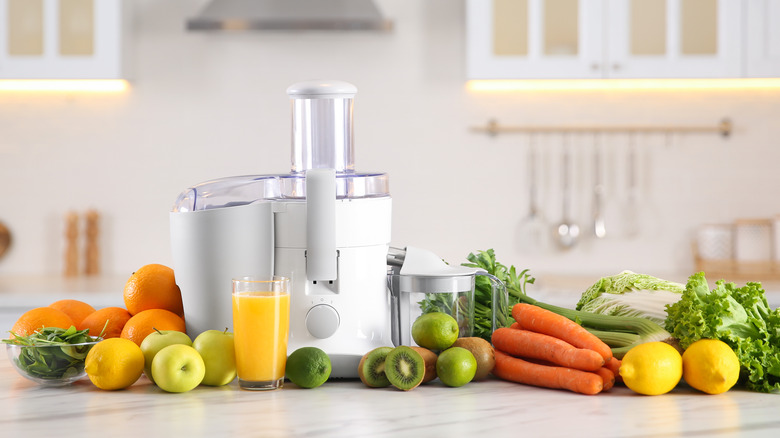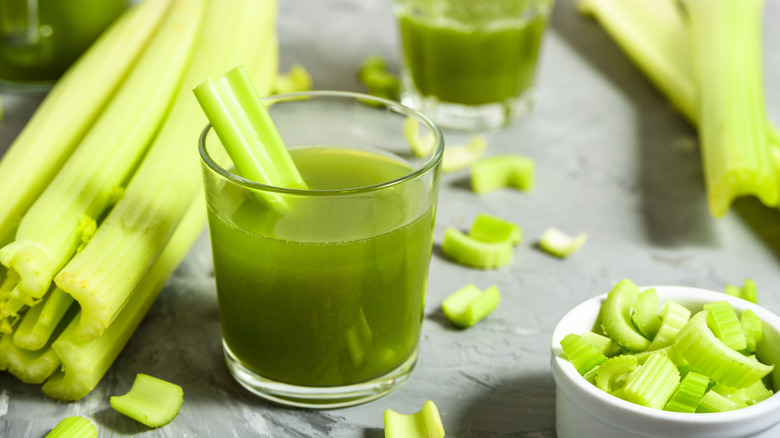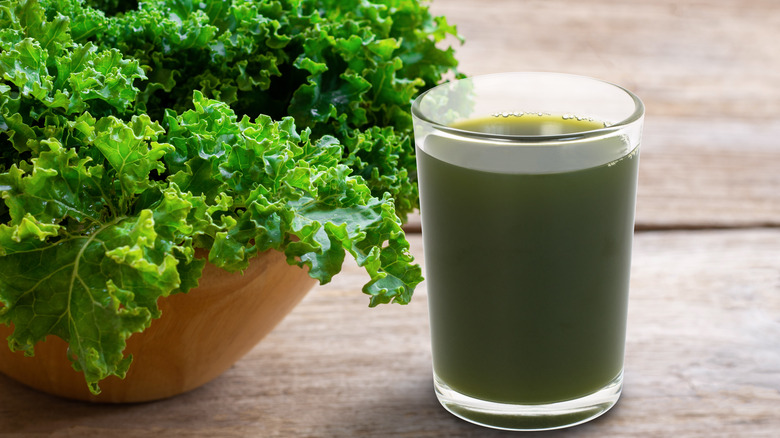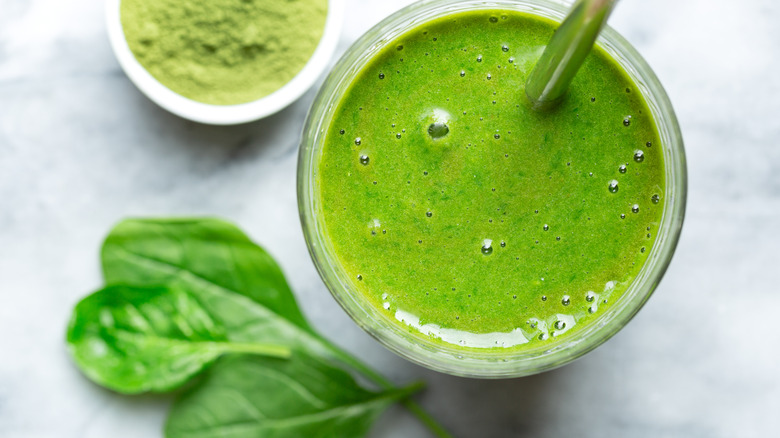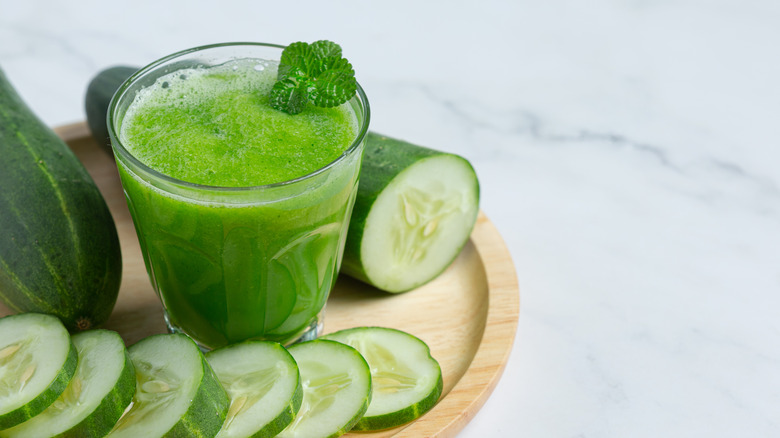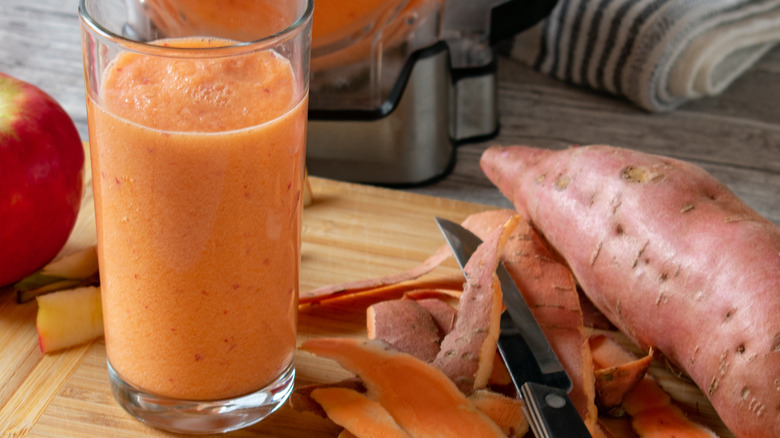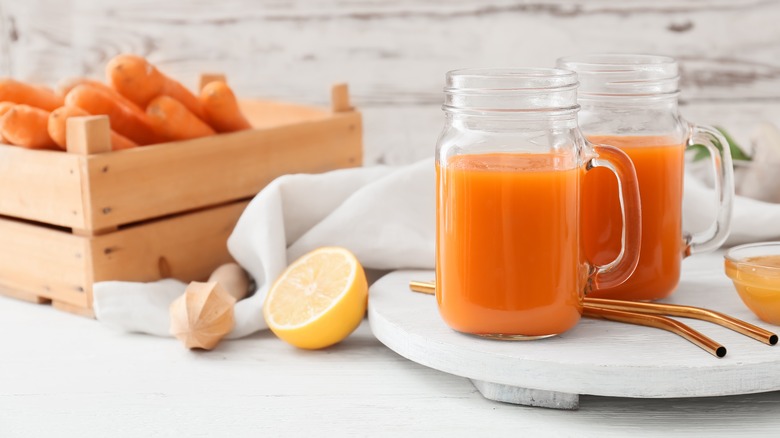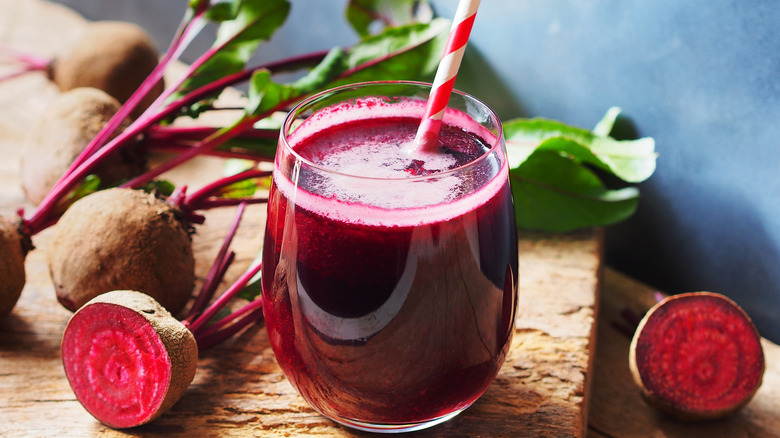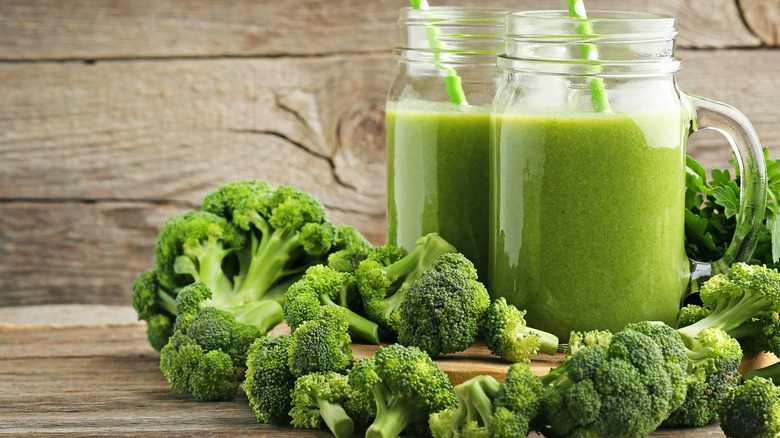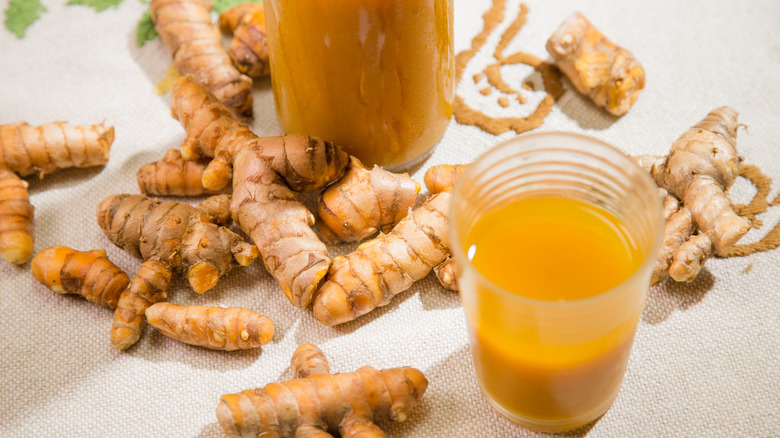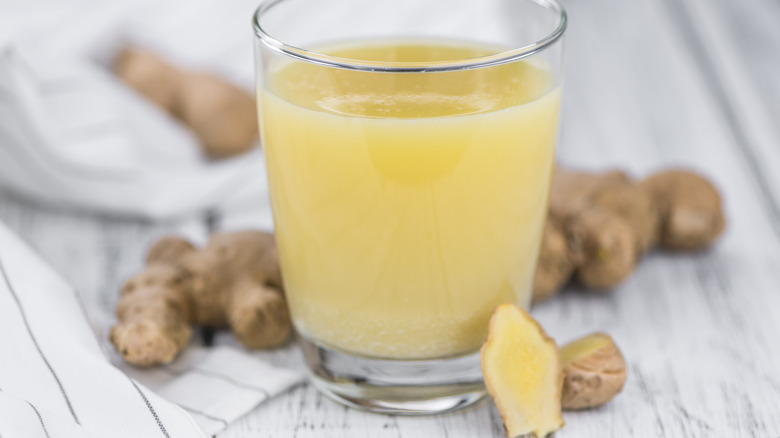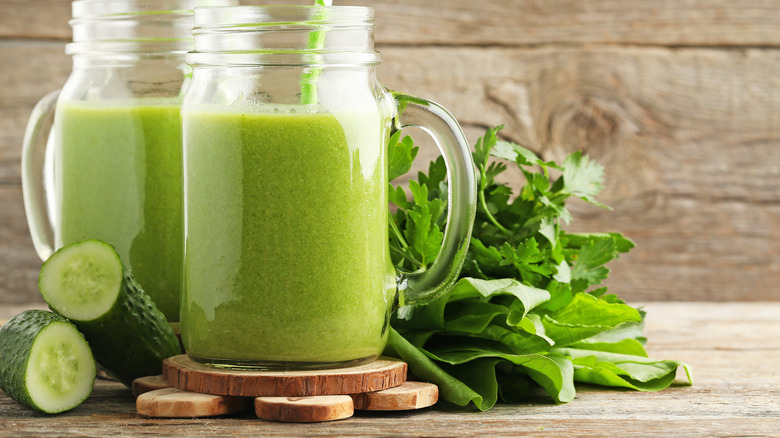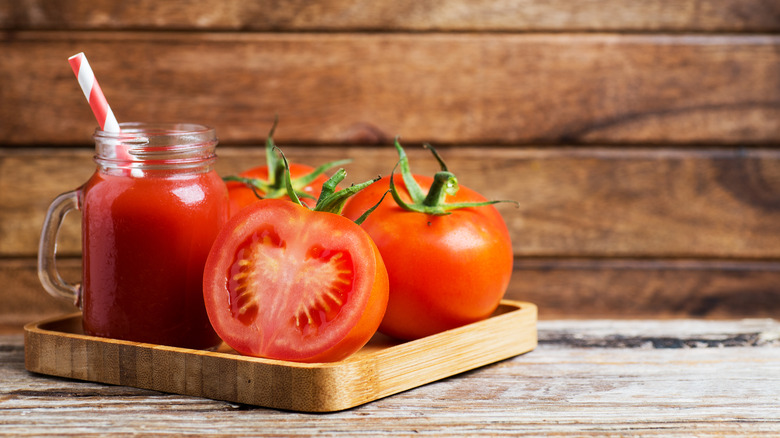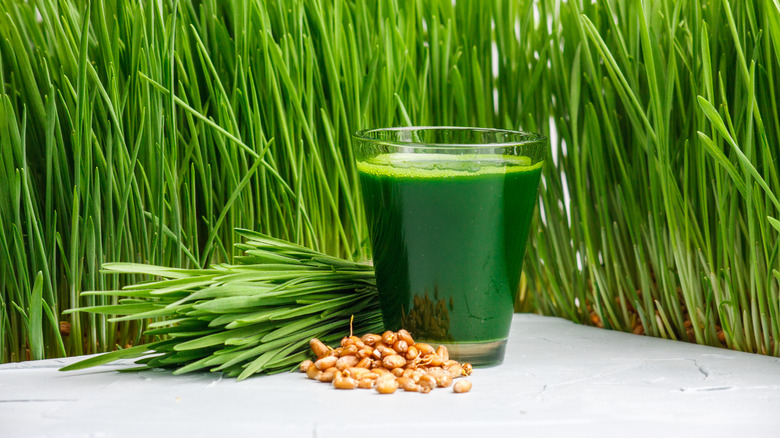The 13 Best Powerhouse Vegetables And Herbs To Juice
In order to achieve optimum health, experts recommend eating two to three cups of vegetables and two cups of fruit every day to reap the most benefits from the vitamins, minerals, and phytonutrients. A diet rich in fruits and vegetables may help stave off long-term diseases like diabetes and cardiovascular disease, while boosting the immune system, strengthening bones, lowering the risk of cancer, and many other positive health outcomes.
Although consuming whole fruits and vegetables is highly recommended, another way to extract the most vitamins and minerals is by juicing them, which according to Healthline, delivers highly concentrated nutritional compounds to all parts of the body from the brain to the heart to the bones.
Prepping fruits and vegetables to juice is relatively specific to the juice machine's manufacturer; however, a general rule of thumb is to thoroughly wash and rinse the product well, then chop it into smaller pieces and remove any stems or parts of the vegetable deemed unsuitable for the juicer. Although it's not necessary to use organic ingredients when juicing, it is recommended as organic produce tends to yield more vitamins and minerals than its non-organic counterparts.
Whether you're looking to do a deep cleanse, or simply want to add more vegetables to your diet, here is a list of the best powerhouse vegetables and herbs to juice to get you started on your health journey.
1. Celery
We get it, celery isn't the most exciting vegetable to throw into the juicer. Consisting of mostly water, celery is a hydrating vegetable that also has potent nutritional properties when juiced and consumed on its own. However, the strong flavor of celery juice takes time to develop a palate for, so most cold pressed juices combine celery with other fruits and vegetables like green apples, spinach, ginger, and cucumber.
Packed with powerful nutrients and vitamins like magnesium, potassium, calcium, and vitamins C and K, celery juice is touted as an anti-inflammatory as it helps the body stave off harmful pathogens that lead to chronic illness and various autoimmune diseases, reports Healthline. Drinking celery juice also offers a dual advantage in that it provides the aforementioned vitamins and nutrients, while also helping the body stay hydrated. Increased hydration may lead to lower blood pressure, better digestion, and improved kidney health. Celery is also an effective way to improve gut health thanks to its hydrochloric acid properties, which help minimize bloat, improve liver function, and relieve constipation.
2. Kale
Often referred to by its moniker, the "queen of greens," kale is having a moment in the nutritional mainstream. Walk into any juice bar and you're bound to see it on the menu. Belonging to the family of cruciferous vegetables like broccoli and cabbage, kale juice is an excellent source of calcium, magnesium, potassium, and vitamins A, C, and K. High levels of potassium have proven to help reduce the risk of stroke and improve coronary health.
Like other members of the cruciferous family, kale acts as a natural detoxifier, and consuming more kale by way of juicing may help break down toxins in the body that will in turn lower the risk for certain types of cancer. Drinking kale juice may also protect your eyesight, support bone health, improve the look and feel of skin and hair, and may also lower blood sugar to help manage type 2 diabetes. Another upside to drinking kale as opposed to eating it is that there is less prep work and waste involved. Rather than separating the leaves from the stem, it's recommended to leave the whole leaf intact and juice the kale in its entirety.
3. Spinach
Another powerhouse leafy green that packs a nutritional punch when juiced, spinach is known for its high nutritional content, antioxidants, and phytonutrients, like iron, magnesium, potassium, zinc, folate, and vitamins A and E. The vitamin and mineral content of spinach is shown to help protect the heart, brain, and even DNA makeup from disease and illness (via Health). No wonder Popeye was eating this stuff for a blast of nutritional super power.
Research is also showing that spinach contains certain compounds known to battle colon cancer, and drinking spinach juice may help reduce the size of cancerous tumors. Spinach juice is bursting in antioxidants known to greatly improve vision and lower the risk of cataracts, including lutein and zeaxanthin. High in naturally-occurring nitrates, spinach juice helps increase blood flow while reducing blood pressure in the body. Lastly, while most dark leafy greens are often described as having a bitter taste, especially when extracted into juice, spinach is on the sweeter side, making it a versatile green that can be incorporated into other juice concoctions whether fruit or vegetable-based.
4. Cucumbers
Fused into both fruit and vegetable-based cold-pressed juices, as explained by Organic Facts, cucumber juice is packed with nutritional health benefits. Touted for its cleansing and detoxifying properties, cucumber juice may help aid in digestion, improve kidney function, reduce bloating, and increase nutrient absorption in the body (via Medical Medium). High levels of vitamins A, C, and K make cucumber juice a powerful antioxidant, which helps fight off harmful toxins while providing a boost to the immune system.
Cucumber juice also boasts high levels of calcium, which acts as an electrolyte when absorbed into the body, and may help improve hydration and cell function, as well as strengthen the nervous system. Aside from improved hydration from the high water content, another added benefit in drinking cucumber juice (which is incredibly refreshing during summer months btw) is that it serves as a natural detoxifier, which helps to improve the look and feel of skin and hair. Drinking two cups of cucumber juice on an empty stomach may even help lower a fever in children or the elderly.
5. Sweet potatoes
More typically used in casseroles, curry dishes, and in a deep fryer, sweet potatoes are nutritional powerhouses that may be most beneficial when juiced. As explained by The Juice Chef, the process of juicing removes the fiber, while extracting all the vital nutrients and minerals from the vegetable or fruit, making sweet potatoes a top-notch contender for the juicer. (And on a side note, if you're looking for the best juicer, we have a few suggestions.)
It's best to use sweet potatoes that are firm with no signs of sprouting, and it's not necessary to peel or cook the potato before juicing. In fact, leaving them raw and skin-on will ensure the most beneficial enzymes and nutrients are extracted from the vegetable. Low in sugar, sweet potato juice is known to stabilize blood sugar levels, as well as help combat diabetes. Sweet potato juice is also high in potassium, and may help reduce muscle cramps, lower stress levels, and improve digestive health. With an abundance of Vitamins A, B, and C, consuming sweet potato juice as part of a routine healthy diet may reduce the risk of certain types of cancer, as well as combat emphysema and lung disease (via WebMD).
6. Carrots
Carrots may be one of the most popular vegetables to juice, and for good reason. As pointed out by Healthline, carrot juice is loaded beta carotene and cancer-fighting antioxidants, making carrot juice just as beneficial to your health as it is sweet on the taste buds. Carrot juice is especially good for adding to other juices such as kale or celery that may need a blast of sweetness.
It may help with preventing vision loss, promote healthy skin, and boost the immune system, too. Studies have also shown that a diet rich in beta carotene can improve cognitive function and reduce the risk of dementia and Alzheimer's. Furthermore, beta carotene is a natural method for improving the symptoms of topical skin conditions like eczema and psoriasis, and may protect against damage caused by ultraviolet rays. Some studies have also shown that beta carotene as well as other compounds found in carrot juice may help prevent certain types of cancer, including leukemia.
Not only is carrot juice packed with vitamins and nutrients, it also improves digestion while optimizing the body's ability to absorb more nutrients from other types of foods.
7. Beets
Jam-packed with nutritional benefits, beetroot juice is a superfood with super powers ranging from lower blood pressure to preventing anemia (via Medical News Today). When juiced, beets are both vibrant in color and in nutrient and mineral compounds, which include nitrates, iron, vitamins A and B, and betalains, which contain anti-inflammatory properties and may help reduce chronic inflammation.
Studies have shown that drinking a glass of beetroot juice can immediately lower blood pressure due to the high quantity of nitrates, which helps dilate the blood vessels and improve blood flow.
Furthermore, nitrates not only stimulate blood flow, but also increase oxygen flow to muscles, which may help improve athletic performance. Extracting juice from the beetroot plant increases is a good way to get a dose of phytochemical compounds delivered to the body, which are helpful in regulating blood sugar levels. To prepare beets for juicing, it's recommended to leave the skin on to extract the most nutrients, but to trim the tops off, and chop the beet into smaller pieces so it passes through the juicer easily.
8. Broccoli
Belonging to the family of cruciferous vegetables, which includes cabbage, bok choy, brussels sprouts, cauliflower, and other leafy greens, broccoli has been hailed in the health community for centuries thanks to its dense nutritional profile. An abundant source of vitamin K, juicing broccoli helps with the overall function and performance of the kidneys, liver, brain, and blood systems (via SF Gate).
Vitamin K combined with high levels of manganese found in broccoli juice may also help heal wounds faster, as well as stimulate bone growth and density. Cruciferous vegetables like broccoli also contain an abundance of carotenoids, which benefit the body by improving vision, stimulating red blood cell counts, and preserving the overall health of the immune system. Juicing broccoli florets as well as the stems is a great way to utilize the entire vegetable and reduce waste, and both may be added in with other vegetables or fruits like carrots and apples to enhance the flavor of the juice.
9. Turmeric
Native to Southeast Asia, turmeric is a superfood plant with numerous uses that has also been used in traditional medicine throughout history. The active ingredient in turmeric that makes it a potent antioxidant unlike any other is curcumin (via Everyday Health). Research has shown that curcumin potentially has the power to alleviate depression, improve longevity, help reduce the risk of Alzheimer's, protect the body from free radicals, reduce blood pressure, boost the immune system, and may help stave off chronic diseases like cancer and heart disease.
Belonging to the Zingiberaceae family, turmeric is often found in powder form, but is most beneficial when juiced fresh from the root. While most anti-inflammatory properties found in fruits and vegetables serve as a method of relief in chronic illness, studies have shown that turmeric may actually help prevent them as well. Studies in mice have shown that a diet rich in curcumin may decrease tumor growth caused by cancerous cells that lead to breast, pancreatic, and prostate cancers, to name a few, though replicating this success in humans is still being researched.
When juicing turmeric root, it's best to store it in a cool, dark place and to use it within a few days as it tends to rot more quickly than other vegetables.
10. Ginger
Another member of the Zingiberaceae family, ginger root has been used in ancient medicine practices for centuries, and is growing in popularity in the health and wellness world (via Healthline). Most recognized as a natural remedy for digestive issues, concentrated levels of ginger root, such as ginger juice or a ginger supplement, have proven to help relieve nausea, indigestion, and other stomach issues, as well as combat bacteria in the gut like E.coli and intestinal cramping.
For those looking to watch their weight, burn more calories, and reduce hunger cravings, consuming more ginger has been shown to boost weight loss. Another interesting health benefit specific to ginger is derived from the active compound gingerols, which is linked to reducing bacteria in the mouth, as well as brightening teeth. As an anti-inflammatory, ginger juice may also help soothe sore muscles, and studies have shown that athletes who consume concentrated levels of ginger on a regular basis report less pain than those who don't.
11. Parlsey
An herb that is most commonly used as a garnish, parsley is a nutritional powerhouse, and according to Medical News Today, half a cup provides more than the daily recommended intake of vitamins K and A. However, a simple garnish won't provide the quantity of parsley needed to reap its most beneficial health rewards, so juicing this potent herb is the best way to extract all of the vitamins and nutrients it has to offer.
Vitamin K is highly regarded for its contribution to healthy, strong, resilient bones, and is the densest vitamin found in parsley, alongside vitamins A and C, which help protect against eye-related problems while building a healthy immune system, respectively. When compared to an equal serving size of spinach, parsley delivers double the amount of iron to the body, which is one of the most important minerals in the body in terms of growth, development, oxygen, and red blood cells. Parsley is also a carminative herb, which is a natural remedy for bloating, gas, and other intestinal issues that cause stomach discomfort.
When juicing parsley, there's no need to trim the leaves from the stem as the entire herb may be juiced, which extracts the most vitamins and nutrients from the herb for the body to absorb.
12. Tomato juice
A popular juice found in the dry food aisles of any grocery store, tomato juice is best consumed when juiced at home without the use of additives and added sodium (looking at you, V8). A perennial plant, an added benefit in juicing tomatoes is the ability to grow them in almost any region on the planet, making them one of the most accessible to the vast majority of people. Seriously, if you're thinking about starting a vegetable garden, tomatoes are one of the easiest vegetables/fruits to grow and juice.
Among the many nutritional benefits, fighting obesity is one of the most impressive qualities of tomato juice, as one glass contains high levels of leptin, which is a hormone released in the body that sends signals of fullness to the brain, curbing cravings and preventing overeating. According to Organic Facts, tomatoes are also a natural detoxifier, and drinking tomato juice is often used to help with kidney and liver cleanse.
13. Wheatgrass
A list of powerhouse vegetables to juice would not be complete without wheatgrass, also known as the green shoots from the wheat plant. Most touted for its high levels of chlorophyll, which also give it a vibrant green color, a serving of wheatgrass contains more vitamin C than oranges and more vitamin A than carrots, which makes wheatgrass a nutritional powerhouse in one single shot.
The potent taste of wheatgrass may be more palatable when mixed in with other juices, but the best way to reap its nutritional rewards is by simply juicing it into a shot-glass-sized serving that is undiluted, and consuming it on an empty stomach within minutes of juicing it. Other health benefits delivered to the body from wheatgrass include nutritional compounds like enzymes, amino acids, flavonoids, alkaloids, and tannins, all of which may help boost energy levels. Besides higher energy levels, wheatgrass may also combat chronic illness, improve skin, hair and bone density, reduce the risk of cancer and cardiovascular disease, and promote longevity.
